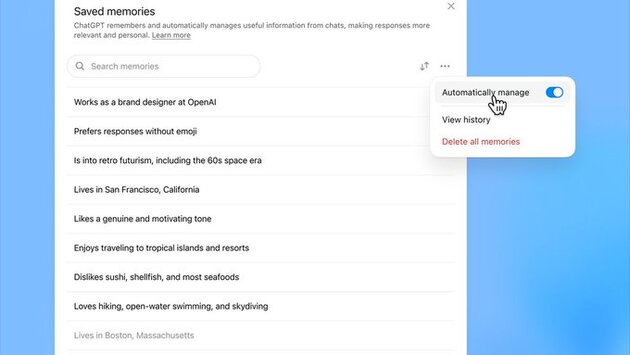Alerts

ChatGPT is smarter now that it's learned to forget — a huge memory upgrade is coming that could redefine how users interact with the AI assistant. OpenAI’s latest enhancement gives ChatGPT the remarkable ability to manage its own memory — remembering what truly matters while automatically letting go of what doesn’t.
This update marks a major shift from how AI chatbots have traditionally handled user data. Instead of endlessly holding onto information, ChatGPT now behaves more like a human mind — balancing memory and forgetting to create more natural, useful conversations.
ChatGPT’s memory feature has already transformed the chatbot experience by allowing it to remember facts shared across conversations — such as your name, work, or preferences. Now, with this new update, the AI’s memory won’t just collect and store data; it will actively prioritize what’s important and discard what’s not.
This means you won’t have to manually delete or manage memories anymore. The model can decide which details enhance future chats and which ones have outlived their usefulness.
AI models are most effective when they can adapt over time. Previously, ChatGPT users had to manage their stored information manually, which could lead to cluttered memory and confusing responses.
By teaching ChatGPT to forget, OpenAI ensures the AI remains relevant, responsive, and less prone to outdated or irrelevant details. Users will no longer encounter the dreaded “memory full” notification — instead, ChatGPT will streamline conversations on its own.
This balance of remembering and forgetting allows the chatbot to evolve intelligently, improving accuracy, tone, and personalization over time.
ChatGPT’s new automatic memory prioritization system uses algorithms that mimic how humans process memories. It determines what information to keep based on frequency, context, and recentness of use.
For example, if you often discuss a specific project or topic, ChatGPT will remember key points to assist you more effectively. But if certain details haven’t come up for months, the AI may gradually let them fade away — keeping your experience clean, relevant, and personal.
This upgrade makes ChatGPT feel more like a true digital companion. It will understand you better, maintain continuity, and support long-term interactions without being bogged down by outdated information.
By learning to forget, ChatGPT becomes not only smarter but also more emotionally intelligent — capable of adjusting to your communication style and evolving alongside you.
While the AI’s ability to forget sounds promising, users still retain control over what ChatGPT remembers. You can review, edit, or erase memory data at any time — ensuring full transparency and privacy protection.
This feature also strengthens user trust, as it limits unnecessary data retention and ensures sensitive information doesn’t linger longer than needed.
ChatGPT’s new memory architecture hints at the next phase of conversational AI — one where machines understand context, emotion, and personal relevance at a deeper level.
With this smarter system, OpenAI is paving the way for AI assistants that can adapt in real time — maintaining valuable insights while evolving naturally with each interaction.
𝗦𝗲𝗺𝗮𝘀𝗼𝗰𝗶𝗮𝗹 𝗶𝘀 𝘄𝗵𝗲𝗿𝗲 𝗿𝗲𝗮𝗹 𝗽𝗲𝗼𝗽𝗹𝗲 𝗰𝗼𝗻𝗻𝗲𝗰𝘁, 𝗴𝗿𝗼𝘄, 𝗮𝗻𝗱 𝗯𝗲𝗹𝗼𝗻𝗴. We’re more than just a social platform — from jobs and blogs to events and daily chats, we bring people and ideas together in one simple, meaningful space.
